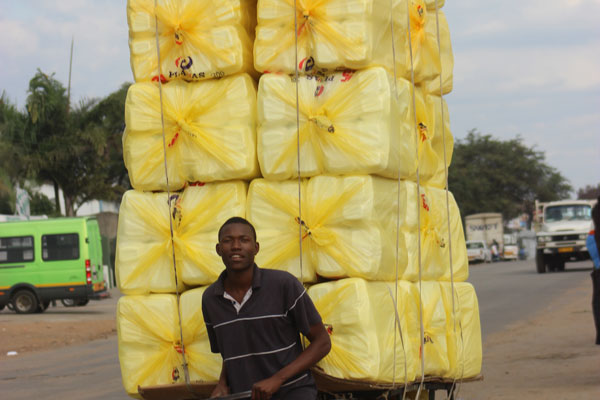
With the current widespread use in Zimbabwe of Expanded Polystyrene (EPS) — popularly known in the country as kaylites — it is very difficult to believe that they were ever banned.
ENVIRONMENT WITH CHIPO MASARA
Last year, Environment, Water and Climate minister Oppah Muchinguri-Kashiri banned the use of EPS packaging and gave those whose businesses depended on its use up to June 30 to switch to alternative packaging or risk being levied. The ban was in line with Statutory Instrument 84 of 2012, as read with Section 140 of the Environmental Management Act (Cap 20:27).
But with just a little over a month left before the ban is expected to come into full effect, the majority of businesses that incorporate the use of kaylites seemingly remain unfazed. Going from one major supermarket to the next yesterday — OK, TM, Pick ‘n’ Pay, Bon Marché, Choppies and Food World, among others — products such as meat, fruits and vegetables, among many others, were packaged the same way they have been getting packed for years — in kaylites!
The use of kaylites is, however, clearly much more widespread in the fast food industry where even big establishments like Chicken Inn and Chicken Slice — that may have been expected to be leading by example — are still very much serving their food in kaylites. In fact, a few years ago, Chicken Inn did switch from kaylites to serving their food in environmentally-friendly cardboard boxes, only to switch back to kaylites in no time.
There are a number of factors that help explain why kaylites have become such a popular form of packaging in Zimbabwe and why, even in the face of legal repercussions, businesses are hell bent on their continued use.
While it might have proven fairly easy to put into effect the EPS ban in most developed countries, the situation on the ground shows it will not be so easy to execute that measure in Zimbabwe.
- Chamisa under fire over US$120K donation
- Mavhunga puts DeMbare into Chibuku quarterfinals
- Pension funds bet on Cabora Bassa oilfields
- Councils defy govt fire tender directive
Keep Reading
Kaylites have become a very popular form of packaging in the country because they are considerably cheaper to make, as the polystyrene foam is made simply by adding a blowing agent to polystyrene — a petroleum-based plastic material. With the harsh economic situation in the country, everyone seems to be looking for that business that requires less money to run while bringing in a handsome profit.
So widespread has the kaylite package-making business become that it is thriving at Magaba in Mbare (the engine of small traders in Zimbabwe), and it is a common sight to see people pushing around cartloads of kaylites that they go around selling to anyone that may need them, from restaurants, supermarkets to vendors.
Thus, the actual ban of kaylites is one that would have far-reaching financial implications on many and as such, it is one that people will not comply with easily. Those that benefit from its continued use see the ban as a threat to their livelihoods and would naturally be getting ready to put up a fight. In that regard, the Environment minister and the Environmental Management Agency certainly have their work cut out for them.
Unfortunately, as much as there are many in the country who would like to see the authorities back off the kaylite issue and allow people to continue making profits out of the business, there is good reason why the continued use of the packaging needs to be banned — and banned for good this time.
Owing to the kaylites’ lightweight nature, they tend to get blown away very easily, even when they have been disposed of properly, in bins.
Most of those that are blown away by the wind spread all over causing an eyesore, other clog drainage systems and block water pipes, while some eventually find their way into the country’s water bodies where they often cause untold suffering to marine life after the poor creatures ingest them.
Maybe the worst thing about the kaylites, as with other forms of polystyrene, is that they are non-biodegradable — meaning they are made up of the type of plastic that cannot be broken down into its base compounds by micro-organisms, air, moisture or soil and therefore will stay in the environment for a long time to come.
So while those that make use of kaylites may forget about them as soon as they make the sale, or after they throw them away after they are done with their meals, kaylites stay in the environment for a very long time, causing havoc as they move along.
Unfortunately, kaylites do not have a recyclable nature as there are no cost-effective large scale means of recycling them, hence once moulded, they cannot be re-moulded.
While some may opt for the option of burning them as a way of getting rid of the kaylite waste, such a route would not only endanger their health by posing the risk of lung cancer and other respiratory diseases, but it would also release greenhouse gases into the environment.
The process of manufacturing kaylites is one that also leaves its fair share of air pollution as it creates large amounts of liquid and solid waste because most are manufactured with HydroChloroFlouroCarbons — greenhouse gases harmful to the ozone layer, which exacerbate global warming and the resultant climate change.
So as much as people may choose to resist the ban and look at it as nothing but yet another vindication by authorities, this is one move that is necessary to save the environment. There is need to look to eco-friendly packaging options manufactured from renewable resources that contain biodegradable materials that are easily recycled.
l For feedback, email: [email protected]












